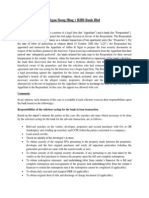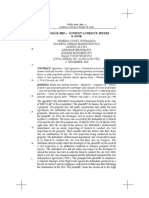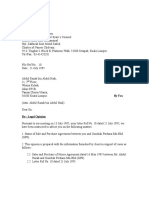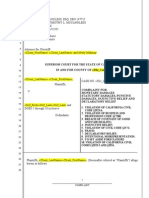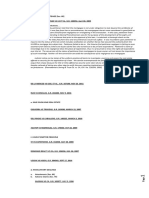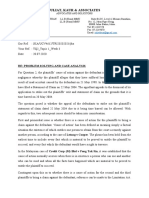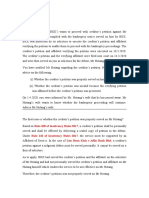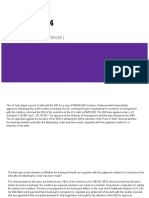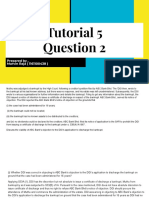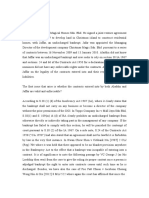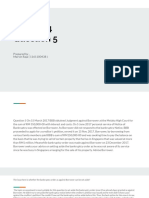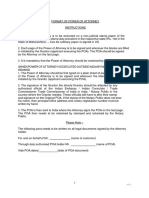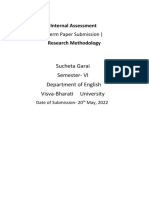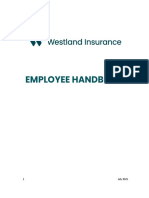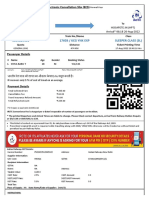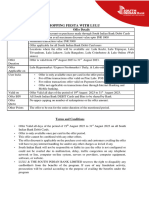CONVEYA
NCING
KOK WENG TUCK & 2 ORS V AMBANK (M)BERHAD
� FACTS OF
THE CASE
David Kok and Partners (“the Firm”) were appointed by Loh Yoke Pah (“the Purchaser”) to prepare the Sale and
Purchase Agreement for a 3 storey shop lot (“the Property”). Subsequently, the Firm was appointed by Ambank
(“the Bank”) to act on the Bank’s behalf in the security documentation for the RM680,000.00 loan to be granted
to the Purchaser to part finance the purchase of the property from one Noor Azizi bin Shanoor (“the Seller”).
The Property was developed by Bandar Putra Permai (“the Developer”) and as there was no issue document of
title at all material times, any sale would necessarily be by way of assignment by the Developer. The firm hired
a freelance despatch on the recommendation of the Seller for the despatch of all documents between the Firm
and the Developer. After the loan was disbursed by the bank, it emerged that the real Developer did not
recognise the Seller as the assignor of the property. The Purchaser, the Seller and the Freelance Despatch were
all perpetrators of an elaborate scam, which the Firm had played right into.
Armed with the letter of undertaking, the Bank subsequently sued the Firm for the losses it had suffered. The
case was taken to the Court of Appeal, where the Firm was held to be 100% liable for losses suffered by the
� ISS
UE
Issue 1 :
Whether the law firm is liable for the negligence and/ breach of
contract and subsequently fully liable for such?
Issue 2 :
Whether the High Court Judge was correct when he found as a
matter of fact and law, the plaintiff was 30% contributorily
negligent
� LA
WS
➤ Section 24 Contract Act 1950
Cases :
➤ Anthony ting Chio Pang v Wong Bing Seng [1997]
➤ Barnette v Chelsea & Kensington Hospital [1969]
➤ Chester v Afshar [2004]
➤ Lai Foh & Sons Sdn Bhd v Skrine & Co [2001]
➤ Lim Soh Wah & Anor v Wong Sin Chong & Anor And Appeal [2001]
➤ Midland Bank Trust Co Ltd & Anor v hett, Stubbs & Kemp [1978]
� JUDGM
ENT
In essence, the learned judge considered three key points: Firstly, the Firm was negligent as it
did not contact the developer directly to ascertain the status of the Property as instructed by the
Bank, and had instead relied on a Freelance Despatch, whom it knew little about. Secondly,
applying the ‘but for test’, the Bank would not have suffered the loss that it had suffered but for
the negligence of the Firm. Lastly, through the Firm’s negligence, the letter of undertaking
which stated that it had agreed to indemnify the Bank in the event that it was found to be
negligent had been triggered. On further appeal, the Federal Court upheld the decision of the
Court of Appeal. The biggest issue here was that the solicitor never realised that the despatch
was not giving genuine documents. Had the solicitor called the developer, they would have
found out the truth of the purported scam which in this case they clearly did not do so which
amounted to a solicitor misconduct. Therefore, the law firm was 100% liable for the loss
� COMME
NTARY
WHS provided their commentary that the property also held under master title,
no subdivision was present hence no IDT as well. The solicitor should have
wrote to the developer to get confirmation of who the owner of the land is etc.
Solicitor in this case relied on the freelance dispatch in this case who was using
fake documents, simply said that this is the letter issued by the developer. The
solicitor never contacted the developer. The High Court relied on the evidence
of facts on which party asked the bank to grant the loan, but the Court of
Appeal relied on the letter of undertaking, where there is a clause to indemnify
the bank.
� PRINCI
PLE
This case makes it clear that such Letters of Undertakings are strictly
enforceable. Hence, it is crucial for conveyancing practitioners to be certain of
the information they seek and obtain, especially with regard to the status of the
security in question. All lawyers should take heed and draw the right lessons
from these conveyancing scams, which is to be watchful of surrounding
circumstances when completing a deal or transaction. If something seems
amiss, take the extra step to investigate and clarify.



